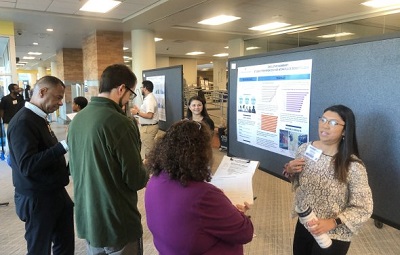Examining Positive Selection in Mycobacterium marinum genomes
Description/Abstract/Artist Statement
Mycobacterium marinum, infects multiple poikilothermic and endothermic species, and can produce zoonotic infections. Comparative analyses of M. marinum isolates revealed two apparent clades, clade I, a mix of human, fish and reptile/amphibian isolates, and clade II, comprised almost exclusively of fish isolates. A sub-clade of clade II, the KST 22 clade, is composed of strains isolated exclusively from hybrid striped bass. To analyze clade II and the KST clade, rates of nonsynonymous to synonymous mutations (dN/dS) were calculated. Analysis of results from dN/dS analyses may reveal virulence and host selection of isolates characteristic to specific M. marinum clades.
Presentation Type
Event
Disciplines
Biology | Microbiology
Location
Learning Commons @ Perry Library, Conference Room 1310
Start Date
2-13-2016 11:30 AM
End Date
2-13-2016 12:30 PM
Upload File
wf_no
Examining Positive Selection in Mycobacterium marinum genomes
Learning Commons @ Perry Library, Conference Room 1310
Mycobacterium marinum, infects multiple poikilothermic and endothermic species, and can produce zoonotic infections. Comparative analyses of M. marinum isolates revealed two apparent clades, clade I, a mix of human, fish and reptile/amphibian isolates, and clade II, comprised almost exclusively of fish isolates. A sub-clade of clade II, the KST 22 clade, is composed of strains isolated exclusively from hybrid striped bass. To analyze clade II and the KST clade, rates of nonsynonymous to synonymous mutations (dN/dS) were calculated. Analysis of results from dN/dS analyses may reveal virulence and host selection of isolates characteristic to specific M. marinum clades.



Comments
Faculty Mentor: Dr. David Gauthier